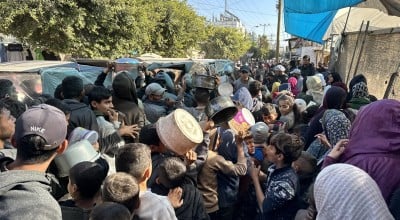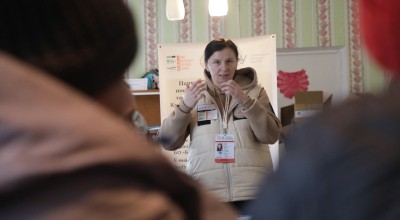
Read our 2024 annual report

Knowledge Hub
Four stories from the Mozambique flood
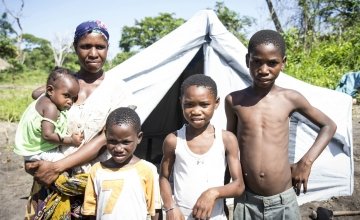
The people of Zambezia Province, Mozambique, have come to expect floods. But torrential rains this January rose to the highest level in 44 years. Havoc was wreaked throughout the province, as bridges, roads, homes, and crops were engulfed by water.
Here are the stories of four Mozambicans whose homes and livelihoods have been destroyed by the recent floods.
Celestino
![Celestino outside the town centre in Maganja da Costa, Mozambique, after the flood. Photo taken by Crystal Wells/Concern Worldwide]](https://admin.concern.net/sites/default/files/styles/360x220/public/media/migrated//Mozambique_Celestino_Web.jpg?changed=2019-04-17T06:33:43+00:00)
Celestino was working at his job cleaning the town centre on a late Monday morning when the floods hit. A father of seven children, aged between 7 and 12, Celestino ran home to find his house had collapsed. He recovered two pans and two wet sacks of rice. “Our chickens, everything, were washed away,” he says.
He returned to the town centre with his wife and children. Celestino’s family stayed in the health centre for two weeks before returning home and building a small shelter from dried palm leaves and sticks. “We only made a small shelter for now,” he says. “We will not build a whole new house—maybe next year. We don’t have the money for a new house.” The floods also washed away the family’s corn, rice and cassava fields. “We have nothing left,” he says.
In this area for the floods to come in January is a tragedy. Normally the floods come in February. This year we will have hunger. We won’t have recovery. The whole area is under water.
Lordes
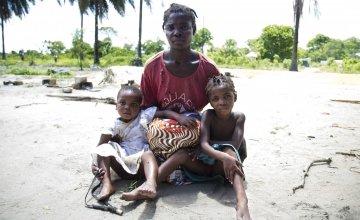
Lordes Fernando’s three children have been sleeping in the open for weeks, with not even a mat to sleep on or a tarp to shelter them from the rain and sun. Her two-year-old child, Lavinho, wears a white cotton dress decorated with small flowers. She explains that they lost all of their clothes in the flood and this is the only thing she now has to wear.
At around 5pm on 12 January, the 42 year old mother was preparing dinner when water from the nearby Licungo River surged towards their home. There was no time to collect any belongings, so she gathered her three children into her arms and set out in search of higher ground.
It happened very fast. [The water] destroyed lots of houses and crops. Our potatoes, our flour, it’s all gone.
At the same time, her husband waded through the water back to their home to find it deserted. He found a canoe and started searching for his family. They eventually found each other that night in a school where other families were seeking shelter. “We stayed there for three days with nothing, no food, nothing,” she says.
Although the conditions are difficult, she does not want to return home. “I don’t want to go back,” she says. “We are very close to the river there. This flood was the worst. We lost many people. I am not sure how many.”
Saide Antonio
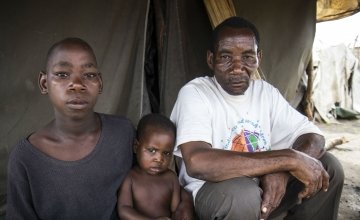
It was 6am and Saide Antonio was in his home with his wife and his five children when water burst into the house. “Instantly water was at my chest,” he says. “I carried my children here.”
The journey took about an hour and it was, sadly, a familiar one. The family made the same trip in 2003 from their community, known as Coco Loco, because of floods.
But this year’s floods were different because they came so suddenly. He said:
When the floods happened, I grabbed my kids and left. All of our food was gone…I did not have time to take anything.
Once his children were safe on higher land, he waded back through the water to retrieve a tent they received in 2003. The family of seven now sleeps in a tent, uncertain of if they will return to Coco Loco.
When asked what they need most, his answer is simple: food. “The hunger will be very serious this year,” he says. “We won’t have anything to eat this year because the floods destroyed everything.”
Noemia
“There were many bodies in the water,” says Noemia Mario. “Many people were taken by the floods.” When heavy rains unleashed flooding along the Licungo River, Noemia and her four children boarded a canoe and left behind their home and all of their belongings.
She remembers the journey vividly, describing how the current was so strong that it tore down anything in its path. “I saw a refrigerator going down the river,” she says.
All of the houses were destroyed...I was very afraid. Thank God we survived.
It took them an hour by canoe to reach Mussaia, a relocation area in Maganja da Costa, a district in Zambezia province. The family traveled by canoe for an hour to reach Mussaia and slept outside for three days with no help. They are now sleeping in a tent on a sandy plot of land alongside other displaced families. "Everything was washed away, our agriculture," she said. "We have nothing."
Noemia’s husband, who was with his mother when the floods came, has gone back to their home to recover whatever is left and plans to come to Mussaia. “I want to stay here,” Noemia says. “I want to be away from the water.”
Response
It is estimated that 157,000 have been affected by the floods. Concern Worldwide is working in four districts in the Zambezia province to provide relief. Widespread destruction means that 70% of the province is unreachable by land, making access difficult. Teams are handing out necessary items like tarps for temporary homes, ropes, blankets and water purification solution.
You can help
By donating to Concern you are supporting our work in countries like Mozambique.



